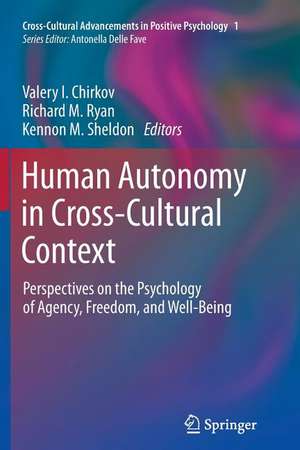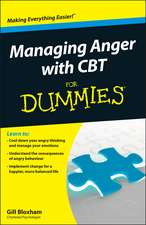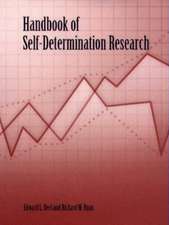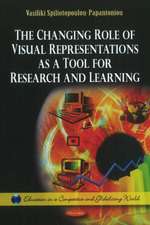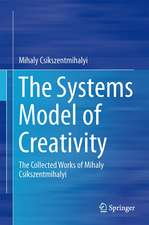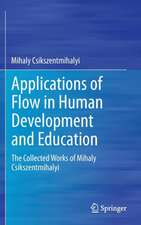Human Autonomy in Cross-Cultural Context: Perspectives on the Psychology of Agency, Freedom, and Well-Being: Cross-Cultural Advancements in Positive Psychology, cartea 1
Editat de Valery I. Chirkov, Richard Ryan, Kennon M. Sheldonen Limba Engleză Paperback – 27 ian 2013
This multidisciplinary team of researchers will collectively explore the nature of personal autonomy, considering its developmental origins, its expression within relationships, its importance within groups and organizational functioning, and its role in promoting to the democratic and economic development of societies. The book is aimed toward developmental, social, personality, and cross-cultural psychologists, towards researchers and practitioners’ in the areas of education, health and medicine, social work and, economics, and also towards all interested in creating a more sustainable and just world society through promoting individual freedom and agency.
This volume will provide
- a theoretical and conceptual account of the nature and psychological mechanisms of personal motivational autonomy and human agency;
- richmultidisciplinary empirical evidence supporting the claims and propositions about the nature of human autonomy and capacities for self-regulation;
- explanations of how and why different psychological and socio-cultural conditions may play a role in promoting or undermining people’s autonomous motivation and well-being,
- discussions of how the promotion of human autonomy can positively influence environmental protection, democracy promotion and economic prosperity.
| Toate formatele și edițiile | Preț | Express |
|---|---|---|
| Paperback (1) | 939.28 lei 6-8 săpt. | |
| SPRINGER NETHERLANDS – 27 ian 2013 | 939.28 lei 6-8 săpt. | |
| Hardback (1) | 945.13 lei 6-8 săpt. | |
| SPRINGER NETHERLANDS – 9 dec 2010 | 945.13 lei 6-8 săpt. |
Din seria Cross-Cultural Advancements in Positive Psychology
- 24%
 Preț: 593.48 lei
Preț: 593.48 lei - 20%
 Preț: 570.73 lei
Preț: 570.73 lei - 18%
 Preț: 894.97 lei
Preț: 894.97 lei - 15%
 Preț: 648.89 lei
Preț: 648.89 lei - 24%
 Preț: 890.18 lei
Preț: 890.18 lei - 18%
 Preț: 793.63 lei
Preț: 793.63 lei - 18%
 Preț: 950.96 lei
Preț: 950.96 lei - 18%
 Preț: 947.35 lei
Preț: 947.35 lei - 18%
 Preț: 948.79 lei
Preț: 948.79 lei - 20%
 Preț: 554.98 lei
Preț: 554.98 lei - 18%
 Preț: 961.41 lei
Preț: 961.41 lei - 15%
 Preț: 643.00 lei
Preț: 643.00 lei - 15%
 Preț: 646.30 lei
Preț: 646.30 lei - 18%
 Preț: 836.22 lei
Preț: 836.22 lei - 15%
 Preț: 643.34 lei
Preț: 643.34 lei - 15%
 Preț: 650.69 lei
Preț: 650.69 lei
Preț: 939.28 lei
Preț vechi: 1145.47 lei
-18% Nou
Puncte Express: 1409
Preț estimativ în valută:
179.79€ • 195.36$ • 151.12£
179.79€ • 195.36$ • 151.12£
Carte tipărită la comandă
Livrare economică 21 aprilie-05 mai
Preluare comenzi: 021 569.72.76
Specificații
ISBN-13: 9789400734531
ISBN-10: 9400734530
Pagini: 300
Ilustrații: XIV, 286 p.
Dimensiuni: 155 x 235 x 16 mm
Greutate: 0.42 kg
Ediția:2011
Editura: SPRINGER NETHERLANDS
Colecția Springer
Seria Cross-Cultural Advancements in Positive Psychology
Locul publicării:Dordrecht, Netherlands
ISBN-10: 9400734530
Pagini: 300
Ilustrații: XIV, 286 p.
Dimensiuni: 155 x 235 x 16 mm
Greutate: 0.42 kg
Ediția:2011
Editura: SPRINGER NETHERLANDS
Colecția Springer
Seria Cross-Cultural Advancements in Positive Psychology
Locul publicării:Dordrecht, Netherlands
Public țintă
ResearchCuprins
Introduction. The Struggle for Autonomy in Personal and Cultural contexts: An Overview, Valery I. Chirkov, Kennon M. Sheldon, and Richard M. Ryan.- Part 1. A Theoretical Context of Human Autonomy, People’s Well-Being, and Happiness.- 1. Positive Psychology and Self-Determination Theory: A Natural Interface, Kennon M. Sheldon and Richard M. Ryan.- 2. A Self-Determination Theory Perspective on Social, Institutional, Cultural, and Economic Supports for Autonomy and their Importance for Well-being, Richard M. Ryan and Edward L. Deci.- 3. Dialectical Relationships among Human Autonomy, the Brain, and Culture, Valery I. Chirkov.- Part II. Human autonomy across cultures and domains of life: health, education, interpersonal relationships, and work.- 4. The Role of Autonomy in Promoting Healthy Dyadic, Familial, and Parenting Relationships across Cultures.- C. Raymond Knee and Ahmet Uysal.- 5. Do Social Institutions Necessarily Suppress Individuals’ Need for Autonomy? The Possibility of Schools as Autonomy Promoting Contexts across the Globe, Johnmarshall Reeve and Avi Assor.- 6. Well-being, Physical Health, and Personal Autonomy, Geoffrey Williams, Pedro J. Teixeira, Eliana Carraca, and Ken Resnicow .- 7. Autonomy in the Workplace: An Essential Ingredient to Employee Engagement and Well-Being in Every Culture, Marylène Gagné and Devasheesh Bhave.- Part III. Human autonomy in modern economy, democracy development, and sustainability.- 8. Capitalism and Autonomy, Tim Kasser.- 9. Economy, People’s Personal Autonomy, and Well-Being, Maurizio Pugno.- 10. The Development of Conceptions of Personal Autonomy, Rights and Democracy and their Relation to Psychological Well-Being, Charles C. Helwig and Justin McNeil.- 11. Personal Autonomy and Environmental Sustainability, Luc G. Pelletier, Daniel Baxter, and Veronika Huta.
Notă biografică
Valery Chirkov received his Ph.D. in social psychology from the University of Rochester, Rochester NY. He is an associate professor in Culture and Human Development and Applied Social Psychology programs in the Department of Psychology at the University of Saskatchewan, Saskatoon, SK. His research interests concern the application of self-determination theory of human motivation in cross-cultural research, psychology of immigration and acculturation, culture and well-being.
Textul de pe ultima copertă
This collection of multi-disciplinary essays explores the nature of personal autonomy, considering its developmental origins, its expression within relationships, its importance within groups and organizational functioning, and its role in promoting the democratic and economic development of societies.In Human Autonomy in Cross-Cultural Context: Perspectives on the Psychology of Agency, Freedom, and Well-Being, the starting point for all essays is self-determination theory, which is an integrated theory of human motivation and healthy development that has been under development for more than three decades. From there, the essays go on to provide the following: a theoretical and conceptual account of the nature and psychological mechanisms of personal motivational autonomy and human agency; rich, multidisciplinary empirical evidence supporting the claims and propositions about the nature of human autonomy and capacities for self-regulation; explanations of how and why different psychological and socio-cultural conditions may play a role in promoting or undermining people’s autonomous motivation and well-being; and discussions of how the promotion of human autonomy can positively influence environmental protection, democracy promotion and economic prosperity.While the topics in this text are varied, the authors all share a vision that human autonomy is a fundamental pre-condition for both individuals and groups to thrive. They also collectively believe that without understanding the nature and mechanisms of autonomous agency, vital social and human problems cannot be satisfactorily addressed.
Caracteristici
This volume provides: A theoretical and conceptual account of the nature and psychological mechanisms of personal motivational autonomy and human agency Rich multidisciplinary empirical evidence supporting the claims and propositions about the nature of human autonomy and capacities for self-regulation Explanations of how and why different psychological and socio-cultural conditions may play a role in promoting or undermining people's autonomous motivation and well-being
